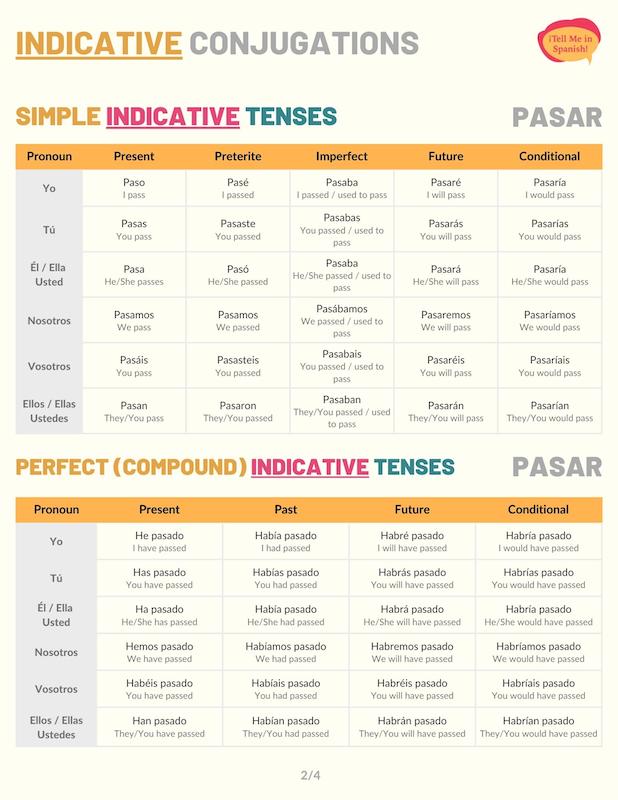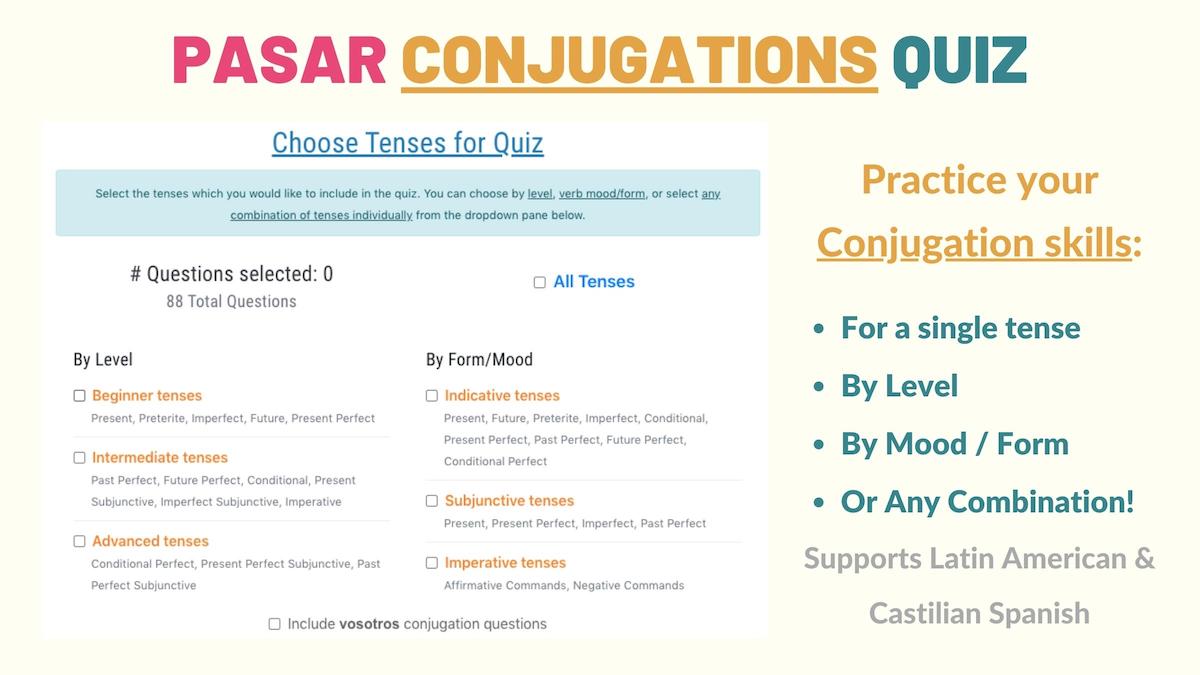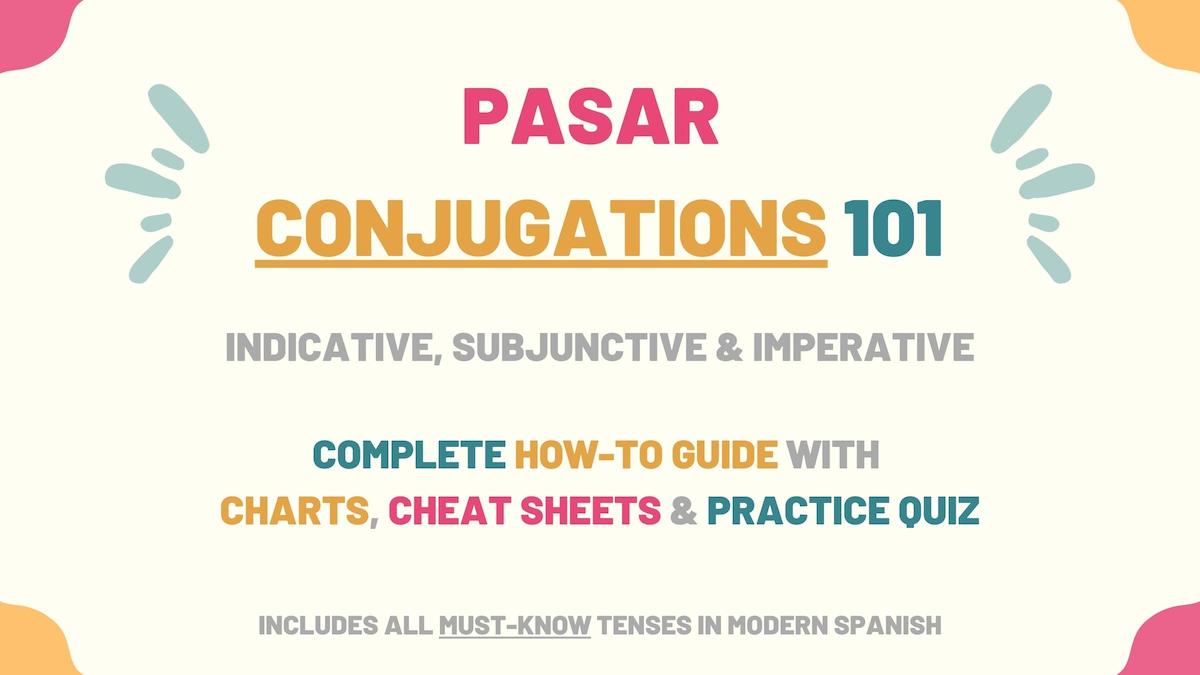Since it’s a regular verb, pasar conjugation patterns are a great way to practice the -AR conjugation type. So, in this guide, we’ll learn how to conjugate pasar to the most common Spanish tenses. Here is a summary of what we’ll cover:
- Pasar Overview
- Indicative Tenses of Pasar Conjugations
- Subjunctive Tenses of Pasar Conjugations
- Imperative (Commands) of Pasar Conjugations
- Uses & Examples
- Download Pasar Conjugation Tables & Uses Cheat sheets
- Pasar Conjugation Practice Quiz
Overview of Pasar
| Verb Characteristic | Property |
|---|---|
| Verb Type | -AR |
| Irregular | No |
| Infinitive | Pasar |
| Gerund (Present Participle) Form | Pasando |
| Past Participle Form | Pasado |
| Synonyms | Ocurrir, llevar, aprobar, excederse |
In Spanish, pasar means ‘to pass’, ‘to happen’, ‘to cross’, ‘to go by’, ‘to come in’, among other applications. The conjugations charts below only have one translation to keep the tables as concise and helpful as possible. You can learn more about the meanings of ‘pasar’ in the section Uses & Meanings.
Indicative Conjugations of Pasar
Present tense
Conjugate pasar to the present indicative tense to talk about the things or places people currently pass. For example: Siempre paso afuera de tu casa.
| Person | Conjugation | Translation |
|---|---|---|
| Yo | Paso | I pass |
| Tú | Pasas | You pass |
| Él / Ella Usted | Pasa | He/She passes You (formal) pass |
| Nosotros | Pasamos | We pass |
| Vosotros | Pasáis | You pass |
| Ellos / Ellas Ustedes | Pasan | They pass You (plural) pass |
Preterite tense
Pasar’s preterite conjugations allow you to talk about things that happened or express that someone passed something to another person. For instance: Juan me pasó tu número.
| Person | Conjugation | Translation |
|---|---|---|
| Yo | Pasé | I passed |
| Tú | Pasaste | You passed |
| Él / Ella Usted | Pasó | He/She passed You (formal) passed |
| Nosotros | Pasamos | We passed |
| Vosotros | Pasasteis | You passed |
| Ellos / Ellas Ustedes | Pasaron | They passed You (plural) passed |
Imperfect tense
Pasar imperfect conjugations allow you to talk about the things or places that someone passed for an extended period of time. For instance: El camión pasaba a las ocho de la mañana.
| Person | Conjugation | Translation |
|---|---|---|
| Yo | Pasaba | I passed I used to pass |
| Tú | Pasabas | You passed You used to pass |
| Él / Ella Usted | Pasaba | He/She passed He/She used to pass You (formal) passed You (formal) used to pass |
| Nosotros | Pasábamos | We passed We used to pass |
| Vosotros | Pasabais | You passed You used to pass |
| Ellos / Ellas Ustedes | Pasaban | They passed They used to pass You (plural) passed You (plural) used to pass |
Near future
Use the structure ir (present tense) + a + infinitive (in this case, ‘pasar’) to form the Spanish immediate future. We use these conjugations to express that someone is about to pass something to another person or is passing by a certain location.
For instance: ¿Mañana van a pasar por aquí?
| Person | Conjugation | Translation |
|---|---|---|
| Yo | Voy a pasar | I’m going to pass |
| Tú | Vas a pasar | You’re going to pass |
| Él / Ella Usted | Va a pasar | He/She is going to pass You (formal) are going to pass |
| Nosotros | Vamos a pasar | We’re going to pass |
| Vosotros | Vais a pasar | You’re going to pass |
| Ellos / Ellas Ustedes | Van a pasar | They’re going to pass You (plural) are going to pass |
Future simple tense
Pasar future simple tense forms are used to talk about things that will happen or to express that someone will pass something to another person. No sé qué pasará, pero todo va a estar bien.
| Person | Conjugation | Translation |
|---|---|---|
| Yo | Pasaré | I will pass |
| Tú | Pasarás | You will pass |
| Él / Ella Usted | Pasará | He/She will pass You (formal) will pass |
| Nosotros | Pasaremos | We will pass |
| Vosotros | Pasaréis | You (formal) will pass |
| Ellos / Ellas Ustedes | Pasarán | They will pass You (plural) will pass |
Conditional tense
Conjugate pasar to the Spanish conditional tense to express that something would happen, or a person would pass something to someone else. For instance: ¿Qué pasaría si no voy?
| Person | Conjugation | Translation |
|---|---|---|
| Yo | Pasaría | I would pass |
| Tú | Pasarías | You would pass |
| Él / Ella Usted | Pasaría | He/She would pass You (formal) would pass |
| Nosotros | Pasaríamos | We would pass |
| Vosotros | Pasaríais | You would pass |
| Ellos / Ellas Ustedes | Pasarían | They would pass You (plural) would pass |
Present perfect tense
The formula to conjugate to the Spanish present perfect tense is haber in the present tense + pasado (past participle). We conjugate pasar to the present perfect to talk about what people have or haven’t passed. For example: ¿Por qué no nos has pasado la sal?
| Person | Conjugation | Translation |
|---|---|---|
| Yo | He pasado | I have passed |
| Tú | Has pasado | You have passed |
| Él / Ella Usted | Ha pasado | He/She has passed You (formal) have passed |
| Nosotros | Hemos pasado | We have passed |
| Vosotros | Habéis pasado | You have passed |
| Ellos / Ellas Ustedes | Han pasado | They have passed You (plural) have passed |
Past perfect
The Spanish past perfect of pasar is used to communicate that someone had passed something before a past action or another point in the past. For instance: Ya habíamos pasado por aquí. To form the past perfect in Spanish, use the imperfect form of ‘haber’ and the past participle form of ‘pasar’.
| Person | Conjugation | Translation |
|---|---|---|
| Yo | Había pasado | I had passed |
| Tú | Habías pasado | You had passed |
| Él / Ella Usted | Había pasado | He/She had passed You (formal) had passed |
| Nosotros | Habíamos pasado | We had passed |
| Vosotros | Habíais pasado | You had passed |
| Ellos / Ellas Ustedes | Habían pasado | They had passed You (plural) had passed |
Future perfect
In the future perfect tense, pasar communicates that someone will have passed something or by a location by or before a certain moment in the future. Mañana habré pasado temprano.
| Person | Conjugation | Translation |
|---|---|---|
| Yo | Habré pasado | I will have passed |
| Tú | Habrás pasado | You will have passed |
| Él / Ella Usted | Habrá pasado | He/She will have passed You (formal) will have passed |
| Nosotros | Habremos pasado | We will have passed |
| Vosotros | Habréis pasado | You will have passed |
| Ellos / Ellas Ustedes | Habrán pasado | They will have passed You (plural) will have passed |
Conditional perfect
We conjugate pasar to the conditional perfect tense to express that someone would have passed something or by a certain location as long as a past condition had been met. With these conjugations, pasar can also be used to talk about what would have happened.
For example: Si no me hubieras ayudado, no sé qué habría pasado.
| Person | Conjugation | Translation |
|---|---|---|
| Yo | Habría pasado | I would have passed |
| Tú | Habrías pasado | You would have passed |
| Él / Ella Usted | Habría pasado | He/She would have passed You (formal) would have passed |
| Nosotros | Habríamos pasado | We would have passed |
| Vosotros | Habríais pasado | You would have passed |
| Ellos / Ellas Ustedes | Habrían pasado | They would have passed You (plural) would have passed |
Progressive tenses
The progressive forms of pasar express that someone is passing something at the moment of speaking. For instance: Estamos pasando afuera de la escuela. The Spanish progressive tenses are formed with estar conjugated + pasando (present participle).
| Progressive Tense | Formula | Translation Example |
|---|---|---|
| Present | Estar (present) + pasando | I am passing |
| Preterite | Estar (preterite) + pasando | You were passing |
| Imperfect | Estar (imperfect) + pasando | He was passing |
| Future | Estar (future) + pasando | We will be passing |
| Conditional | Estar (conditional) + pasando | They would be passing |
Pasar Subjunctive Conjugations
The Spanish subjunctive tenses allow you to refer to wishes, requests, suggestions, expectations, doubts, or hypothetical situations. In the sections below, you’ll find the pasar conjugation charts for the most common subjunctive tenses.
Present subjunctive
Pasar subjunctive conjugations are used to express hopes, suggestions, requests, or wishes regarding someone passing something or by a certain location. Here is an example: Dile a Julia que me pase la sal.
| Person | Conjugation | Translation |
|---|---|---|
| Yo | Pase | I pass |
| Tú | Pases | You pass |
| Él / Ella Usted | Pase | He/She passes You (formal) pass |
| Nosotros | Pasemos | We pass |
| Vosotros | Paséis | You pass |
| Ellos / Ellas Ustedes | Pasen | They pass You (plural) pass |
Present perfect subjunctive
The present perfect subjunctive of pasar is formed with haber in the present subjunctive + pasado. Use this tense to wonder, express doubt or wish that someone has already passed something. No creo que Carmen les haya pasado tu número.
| Person | Conjugation | Translation |
|---|---|---|
| Yo | Haya pasado | I have passed |
| Tú | Hayas pasado | You have passed |
| Él / Ella Usted | Haya pasado | He/She has passed You (formal) have passed |
| Nosotros | Hayamos pasado | We have passed |
| Vosotros | Hayáis pasado | You have passed |
| Ellos / Ellas Ustedes | Hayan pasado | They have passed You (plural) have passed |
Imperfect subjunctive
Conjugate pasar to the imperfect subjunctive to talk about past suggestions, requests, and wishes someone had about a person passing something. Te pedí que les pasaras el pan.
Depending on the type of Spanish you’re using, there are two ways to form the imperfect subjunctive:
Latin American Spanish version
| Person | Conjugation | Translation |
|---|---|---|
| Yo | Pasara | I passed |
| Tú | Pasaras | You passed |
| Él / Ella Usted | Pasara | He/She passed You (formal) passed |
| Nosotros | Pasáramos | We passed |
| Ellos / Ellas Ustedes | Pasaran | They passed You (plural) passed |
Note: Vosotros is not used in Latin American Spanish. Therefore, the chart above doesn’t include this pasar conjugation.
Castilian Spanish version
| Person | Conjugation | Translation |
|---|---|---|
| Yo | Pasase | I passed |
| Tú | Pasases | You passed |
| Él / Ella Usted | Pasase | He/She passed You (formal) passed |
| Nosotros | Pasásemos | We passed |
| Vosotros | Pasaseis | You passed |
| Ellos / Ellas Ustedes | Pasasen | They passed You (plural) passed |
Past perfect subjunctive
In the past perfect subjunctive, pasar expresses that someone would have passed something if a past circumstance was met. Additionally, these conjugations also express regret for something you had or hadn’t passed.
For example: Si hubiéramos pasado por ti, habrías llegado temprano.
| Person | Conjugation | Translation |
|---|---|---|
| Yo | Hubiera pasado | I had passed |
| Tú | Hubieras pasado | You had passed |
| Él / Ella Usted | Hubiera pasado | He/She had passed You (formal) had passed |
| Nosotros | Hubiéramos pasado | We had passed |
| Vosotros | Hubierais pasado | You had passed |
| Ellos / Ellas Ustedes | Hubieran pasado | They had passed You (plural) had passed |
Pasar Imperative Conjugations
The Spanish imperative or commands are the conjugations we use to give orders to someone.
Affirmative commands
Use the affirmative commands of pasar to order someone to pass something to another person. For instance: Pásale la ensalada a tu papá.
| Person | Conjugation | Translation |
|---|---|---|
| Tú | Pasa | Pass |
| Usted | Pase | Pass |
| Vosotros | Pasad | Pass |
| Ustedes | Pasen | Pass |
Take Note: With affirmative commands, direct or indirect object pronouns must be attached to the verb. Click here to check how to place pronouns with the affirmative imperative.
Negative commands
To command people not to pass something, you must use the pasar negative command conjugations. For example: No les pases mi número.
| Person | Conjugation | Translation |
|---|---|---|
| Tú | No pases | Don’t pass |
| Usted | No pase | Don’t pass |
| Vosotros | No paséis | Don’t pass |
| Ustedes | No pasen | Don’t pass |
Meanings of Pasar & Examples
Now that we’ve learned how to conjugate pasar, check this section to see how to apply this verb correctly. Depending on the sentence, pasar can mean:
- To happen / occur
- To pass / To give
- To go ahead / To come in
- To go by
- To pick someone up
- To approve (exams)
[Pasar conjugated] + [complement]
Pasa, por favor.
Please, go ahead.
No me han pasado el pan.
You guys haven’t passed me the bread.
Yo paso por Diana todos los días.
I pick Diana up every day.
¿Qué está pasando con ustedes?
What is happening with you two?
Take Note: When talking about passing something to another person, pasar can work with direct and indirect object pronouns. Spanish direct object pronouns replace the things you’re passing and indirect pronouns the person to which you’re giving that object.
Download Pasar Conjugation Charts & Uses Cheat sheets

While pasar is a regular -AR verb and therefore its conjugations are straightforward, it is highly dynamic in terms of its meanings and uses. I’ve created a free PDF you can download including all of its tense forms as well as its uses with real-world examples.
Practice Quiz: Pasar Conjugation

Now that you know how to conjugate pasar in Spanish, you can practice your regular -AR verb skills by taking this pasar conjugation practice quiz.





